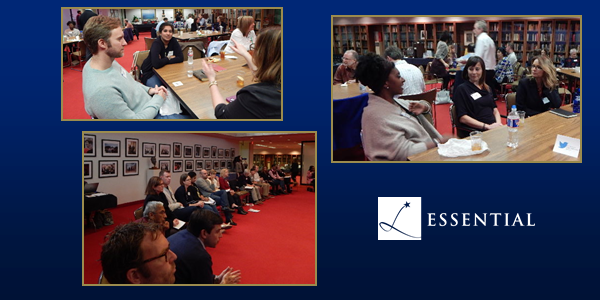
Guest post from Essential Class of 2016 participant Kevin Foster, reflecting on the January class day on the Diversity and Inclusion. Kevin is an Associate Professor of African and African Diaspora Studies at the University of Texas.
Among the first things I noticed chatting with folk after our January Leadership Austin session was that we were far from unanimous in our assessment of the day. Our topic was Diversity and Inclusion, and the lens chosen for the discussion was race, or to be more specific, the Black/White binary view of race. The lens chosen created both possibilities as well as risks. Race, along the Black/White binary, is a framing ideological concept that has driven the growth and success of the nation. The wonderful documentary series that we watched before class bore witness to this.
Acknowledging the ongoing marginalization of black folk is of great importance, especially when black life is so blithely and routinely snuffed out by the State by way of its agents, the police; especially when Blacks are near non-existent in spaces of academic opportunity in our schools and especially when black folk have all but disappeared from the Austin residential landscape as they have left in search of better opportunities and treatment than they have received here.
Blackness remains powerful in our imagination and experience, even when very few black folk are around. Ironically, our January session was a demonstration of this. And therein lies a risk. As we focused on race along the Black/White binary, what of all the other faultiness of discrimination? Sexism, Xenophobia, Homophobia, Classism and more are enacted daily — on purpose or by accident — in blatant and subtle ways.
We live in a bizarre day. These days not only Muslims routinely discriminated against and feared as Muslims, but so are Sikhs (hunh?). Native Texans from generations back are discriminated against as illegal immigrants (what?), and there are African immigrants who, as parents, tell their children to avoid “blacks” because their legacy of slavery renders them pathological (come again?). We live in a strange and complex day, and our day erased that complexity in favor of a familiar frame. I was a bit pained sitting in that big circle, to think that there may be colleagues in the room who had stories to tell and thoughts to share but felt erased in the moment.
Part of my reality is that, even as a “mixed” person, my framing and experiences are “black.” Over the years I have become so comfortable and in love with the aggregate set of experiences (good and bad) that make up who I am, that I was blessed in our January day to be able to turn my attention elsewhere and think,” the heck with me, what about my friends!” So my painful moment was almost my best. Enjoying the freedom to think not of myself, but of peers whom in a short time I have come to love, was the highlight of my day.
NOTE: The opinions of Leadership Austin alumni, faculty members, and guest bloggers are their own, and do not represent an official position of the organization

